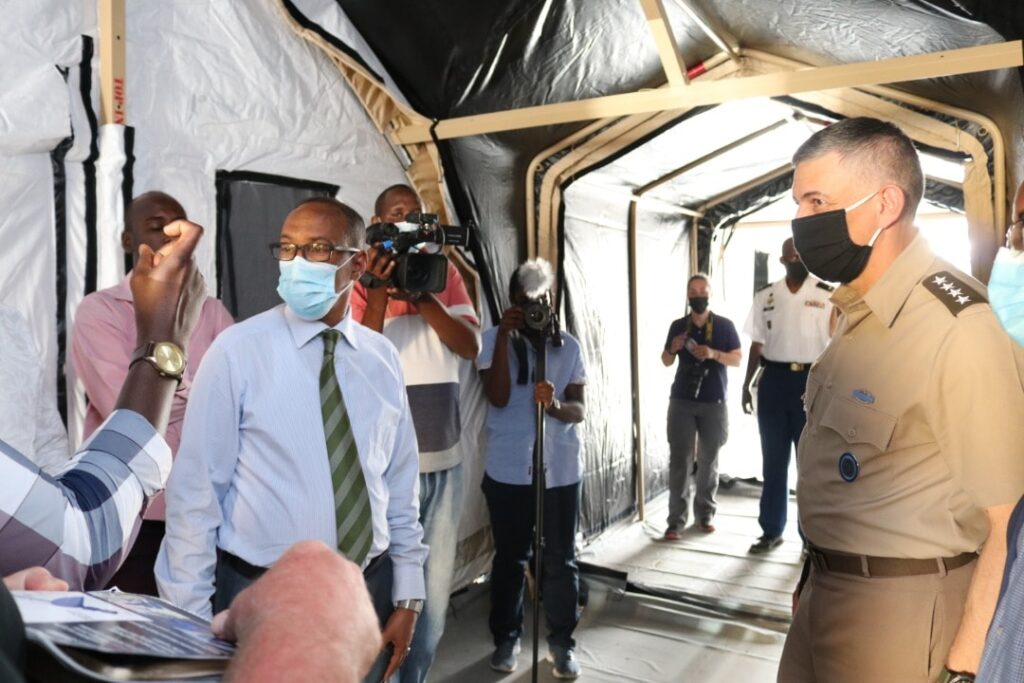ADF STAFF
The U.S. donated a mobile field hospital to Djibouti’s Ministry of Health in late May after the country experienced a deadly surge of COVID-19 infections in April.
The U.S. has donated field hospitals to countries including Ethiopia, Kenya, Niger, Nigeria and South Africa since the pandemic began. They typically cost $1.3 million to $1.6 million and are deployable to remote areas.
U.S. Army Gen. Stephen Townsend, commander, U.S. Africa Command (AFRICOM), and U.S. Ambassador Jonathon Pratt toured the hospital with Djiboutian officials during a handover ceremony.
“It is our priority goal to strengthen security for the United States, Djibouti and the region to improve the access of every citizen to essential medical services,” Pratt said.
Since the start of the pandemic, AFRICOM has contributed $6.2 million to Djiboutian COVID-19 relief efforts. The nation reported its first case in March 2020.
In September 2020, the U.S. donated a polymerase chain reaction machine to Djibouti. The machine detects viruses and other infectious agents by amplifying isolated DNA samples for molecular and genetic study. The devices also can detect HIV/AIDS, tuberculosis and hepatitis C, among other diseases.
Other donations include 95 hospital beds, electrocardiogram machines that monitor patients’ vital signs, 25,000 pairs of latex gloves, 4,000 masks and 500 hygiene kits.
In March, Djibouti became the second country in the World Health Organization’s (WHO) Middle East and North Africa region to receive COVID-19 vaccines through COVAX, the global coalition to ensure that vaccines are distributed equitably. The first phase of Djibouti’s vaccination campaign targeted health care workers, people over 50 and those with medical conditions.
“The arrival of these vaccines marks a new phase in the ongoing response to COVID-19 in Djibouti,” Dr. Mondher Letaief, WHO representative in Djibouti, said on the organization’s website. “The more people who are vaccinated, the more effective the vaccines will become in slowing the spread of the virus, drive down infection rates and protect the whole of society. But we should always remember that vaccinations only work when they are combined with all other public health strategies.”
Mohamed Warsama Dirieh, Djibouti’s minister of health, was grateful for the vaccines.
“The vaccines are a critical part of controlling the spread of the virus and our eventual return to normalcy,” he said on the WHO website, adding that those eligible to receive the shots should get vaccinated as soon as possible.
This June, U.S. President Joe Biden’s administration announced that Djibouti would be one of 92 nations that will share a U.S. donation of 500 million doses of COVID-19 vaccines over the next year.
“We have to end COVID-19, not just at home, which we’re doing, but everywhere,” Biden said during a news conference in Suffolk, England. “There’s no wall high enough to keep us safe from this pandemic or the next biological threat we face, and there will be others. It requires coordinated multilateral action.”
Djibouti’s public health officials have “managed the [COVID-19] crisis well on the whole,” according to a WHO assessment. Just more than 150 deaths from COVID-19 were reported there as of June 16, Africa Centres for Disease Control and Prevention statistics showed.

